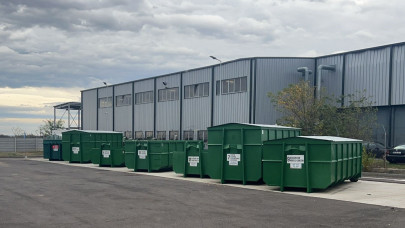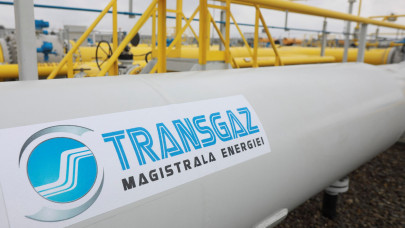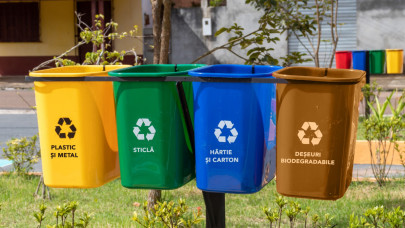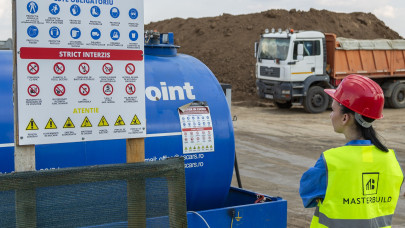In this sense, the companies risk fines between RON 5,000 and 70,000 (€1,000 and 1,400) per contravention identified, and the irregularities found in the companies are numerous considering that the controls from the state authorities are more and more frequent. In addition, companies holding an environmental permit must create and implement a waste prevention program, which must be submitted annually to the National Agency for Environmental Protection (ANPM).
Effective waste management requires, first of all, their correct and complete identification, action followed by the arrangement of a waste storage space, which according to the law must be on a concrete platform, and covered, protected from the weather. Then, each type of waste identified will be assigned the corresponding name and code next to the storage space. Handover of waste will be done only to authorized collectors and the loading-unloading forms will be completed. For economic agents, it is mandatory that the waste management record be drawn up monthly, and the waste report be submitted annually.
"Waste must be seen as a resource, not as another problem that economic agents have to manage, a resource that companies can capitalize on because certain types of waste can be sold. Many companies are not fully aware of the obligations they have towards the authorities or do not know how to correctly interpret the legislative norms. Some companies consider it sufficient to have an environmental permit or to have waste collection contracts. We help them to prevent and reduce the amount of waste and, implicitly, to avoid fines imposed by the authorities. We assess the company's environmental obligations, check if and what measures they have taken up to that point, and identify risks and solutions for compliance with environmental legislation. After the implementation of the necessary measures, the costs of waste management will decrease without taking into account the avoidance of possible fines that may arise in the absence of compliance", explains Daniela Dobre, CEO of Green Environment Support.
There are several solutions for reducing the amount of waste generated in companies. The fastest and most convenient solution is to reduce household waste, for example, manufacturing companies can reintroduce waste into the technological stream by recycling plastic.
Economic agents fail to recycle enough for various reasons, including the lack of an efficient internal organization and the lack of well-developed solutions in the collection and recycling area. A logistics better performance of certain economic operators in the field of collection, plus investment and fundraising, would help in this regard.
Romania is still far from the recycling objectives set at the level of the European Union and the European average, more precisely the recycling level is approximately 11%-12% of municipal waste compared to almost 50% which is the European average.
The controls carried out by the Environmental Guard are the most frequent, at least once a year in companies with environmental authorization, i.e. those that pollute the most. Another source of controls can be notifications or thematic controls from the Environmental Guard or the environmental department of the Local Police. In the case of AFM controls, these can be substantive, which check the last 5 years, or unannounced, and if irregularities are found, the payment amounts in interest and penalties can be several hundred thousand lei depending on the size of the company and the activity carried out.
For example, recently, Green Environment Support managed to reduce the amount of the sanction of a fashion company, with a chain of stores, by approximately RON 23,000 (€4,600), after a control by the Environmental Fund Administration that verified the last five years of activity. It was identified that the wooden pallets were returned to the supplier and that the company also returned to the parent company for part of the goods purchased when there were defects or at the end of the collection, the products were returned in the same packaging in which they came, which resulted in a lower quantity placed on the market than what was declared. The company was exclusively represented by a Green Environment Support specialist in discussions with AFM.
Another example is the case of a manufacturer where the Green Environment Support team carried out an audit regarding the declaration obligations to the AFM. The main problem identified was the payment of large amounts for packaging placed on the market which they pay monthly to Organizations Implementing the obligations of Extended Responsibility for Producers (OIREP), which help to achieve recycling targets. Following the audit, the company made the decision to achieve the recycling target individually by utilizing the packaging waste that remains on site, originating from the raw material, which implies much lower costs to OIREP. Also, in order to be able to more effectively manage the quantities of waste temporarily stored on-site and to reduce the transport costs charged by the collector, a press for cardboard and plastic waste was purchased.
"From our experience, in all fields of activity, there are companies that comply with the law and companies that take absolutely no measures. In general, large companies put in place everything that is legally required, with a few exceptions, or omitted aspects, and there are even requests in this regard from their clients. In small companies, the compliance process is slower, but the number of those implementing measures in this direction is increasing", says Daniela Dobre, CEO of Green Environment Support.













